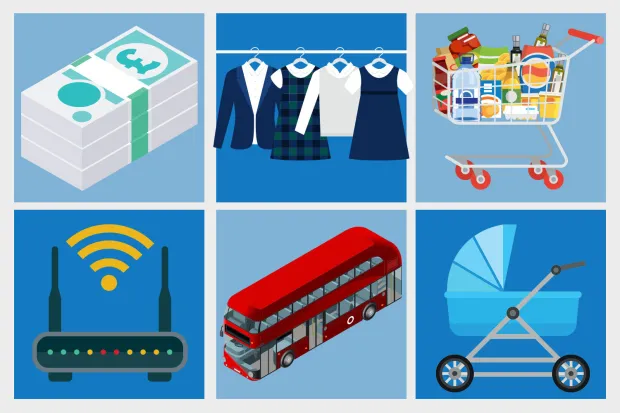HOUSEHOLDS on Universal Credit and other benefits can bag 15 freebies and discounts in February.
There’s a range of help on offer, from discounts on electricity bills to free school meals and even grants if you’re pregnant.
What you’ll be entitled to varies depending on your personal circumstances, so be sure to do your research.
But, in any case, it’s always worth checking in case you qualify.
Here’s everything you need to know about what’s on offer.
Warm Home Discount – £150
Around three million people in total qualify for the Warm Home Discount this winter.
Read more in Benefits
The discount is worth £150 in total, with British Gas, Scottish Power and Octopus Energy among the suppliers handing out the help.
But you only qualify for the discount if you’re on certain benefits, including Universal Credit, Pension Credit and Income Support.
The discount is applied as a one-off deduction on your bill between October and March.
Most people qualify for the discount automatically, but if you don’t you will have to apply.
Most read in Money
Free or cheap broadband – £200
Social tariffs are open to households on certain benefits such as Universal Credit.
And several suppliers offer the tariffs to customers looking to cut the cost of their broadband.
The exact qualifying criteria varies depending on which provider you go with, so it’s worth checking before enquiring.
Not all providers offer social tariffs either, but there is a list of those signed up on the Ofcom website.
Either way, you can use The Sun’s tool, created with Nous, to find out whether you qualify for cheaper broadband in just two minutes, at nous.co/thesun.
Remember to compare the price of any broadband deal on websites such as MoneySupermarket and Uswitch too.
Council tax – up to £2,065
Discounts on council tax are often available for those on a low income or benefits.
Exactly what you can get depends on where you live, as each council sets its own eligibility criteria.
But, in some cases, you can get the major household bill slashed to nothing.
With the average band D council tax bill standing at £2,065 a year, that’s a serious saving if you qualify.
Find out what’s available where you live by using the government’s online tool at gov.uk/apply-for-council-tax-discount.
You’ll usually need to provide some details like your household income, the number of children you have and the number of adults and children you live with.
Plus, you’ll have to state what benefits you’re receiving and how long you’ve lived in the UK for.
Cold weather payments – up to £50
Cold weather payments are issued to households between November and March each winter.
They are paid out in areas that experience sub-zero temperatures for seven consecutive days or more.
For each seven-day period you receive £25, which means you can get double or sometimes even triple this if the weather plummets for long enough.
Payments are made automatically if you qualify, which is usually if you’re on certain benefits such as Universal Credit and Pension Credit – you can see the full list here.
Households in England and Wales receiving the payment will see it in their bank statement as “DWP CWP”.
Those in Northern Ireland will see it as “SSA CWP”.
In Scotland, a new scheme has replaced cold weather payments.
You can see if the cold weather payments have been triggered in your area using the government’s postcode checker tool online.
Energy bill help – up to £2,000
Several suppliers offer energy bill help through hardship funds and give out grants worth thousands of pounds.
British Gas’ Individual and Families Fund was extended this month, meaning qualifying households can get up to £2,000.
You’ll need to contact your supplier directly to see what they offer and eligibility and how much you get can vary between them.
On top of this, there are thousands of charities and organisations that offer cash to struggling families.
Turn2Us has a free grants search tool so you can find out what help is available to you.
Plus, the Household Support Fund, which helps families with the rising cost of living is open until March 31 after being extended.
You can get help via cash grants, energy or supermarket vouchers, and more.
The support is issued by local councils so you should contact yours to see what’s available.
You can do this by using the Government’s council locator tool online.
Pregnancy grant – £500
The Sure Start Maternity grant is a one-off payment worth £500 to help with the cost of having a child.
You don’t have to pay it back and you can find out who’s eligible in our guide.
You’ll qualify if you’re already claiming benefits and expecting your first child, or you have children already and are expecting twins or triplets.
New parents must claim the grant within 11 weeks of the baby’s due date or within six months after the baby is born.
To claim, you’ll need to print out and fill in the Sure Start Maternity Grant (SF100) claim form.
A health professional such as a doctor or midwife must also sign it before you post it to Freepost DWP SSMG.
Free childcare – £1,630
You might be able to get a refund on your childcare costs if you claim Universal Credit.
You can claim back 85% of childcare costs up to £951 for one child or £1,630 for two or more up to August 31 following the child’s 16th birthday.
You used to have to pay your childcare costs yourself up front and then claim the money back through Universal Credit.
But now you can get it covered without having to fork out first after a change to rules that was a huge win for The Sun’s Make Universal Credit Work campaign.
Parents may also be able to take advantage of other childcare support, whether you’re claiming Universal Credit or not, including up to 30 hours of free childcare.
Plus parents can now apply for 15 hours of free childcare for two-year-olds.
Rent help – £2,578
Households on Universal Credit can apply for a Discretionary Housing Payment (DHP), if their entitlement is not enough to cover rent.
The payments give you extra money if your council decides you need help meeting housing costs, and crucially it doesn’t need to be repaid.
You can use it to cover a rent shortfall, rent deposit, or rent in advance if you need to move house.
Each local authority hands out the money on a case-by-case basis though, so it’s best to check in with yours to see if you’re eligible.
The highest average amount that was dished out following freedom of information (FoI) requests by The Sun was found to be £2,578 in Newham, London.
But the amounts can range from as little as 54p to £32,000 depending on need and circumstances as well as where you are.
Learn more about the discretionary housing payment in our guide.
Water bill help – £1,043
Plenty of water companies offer free water-saving devices to households that can slash your bills.
The best thing to do is contact your supplier to see what help is on offer and find out more on the SaveWaterSaveMoney website.
Large families on Universal Credit or other benefits may also be eligible for a cap on their bills under the WaterSure scheme.
To qualify you need to already have a water meter installed, and prove you need to use a lot of water.
You also need to have three or more children under the age of 19 living in the house, and receive child benefit for them.
The amounts you can get off vary, but one saver revealed how they got a more than £1,000 refund through the scheme.
Money for health costs
People on certain benefits can get free NHS prescriptions, if they meet certain criteria.
You can use the Government’s eligibility checker tool on its website to find out what you might be in line for.
NHS prescriptions currently cost £9.35 in the UK so it could make for a decent saving not just in February, but across the year.
You might also get help covering prescription, dental and eyecare costs through the NHS Low Income scheme.
You can even get free wigs and help covering the cost of travel, if it’s to health appointments.
How much you’ll be entitled to depends on financial factors including outgoings and the amount of savings you have in the bank.
The NHS has outlined more information on how to go about claiming on its website.
Cheap travel – £150
Universal Credit claimants can get 50% off their bus and train fares with the Jobcentre Plus travel card.
However, it’s only available if you’re unemployed but looking for work and are on Jobseeker’s Allowance.
You’ll also need to have claimed Universal Credit for three to nine months if you’re aged between 18 and 24 years old.
For those aged 25 or older, you must have claimed the benefit for three to 12 months to be eligible for a discount.
There’s no guarantee you’ll get the discount though – it’s up to your local JobCentre Plus branch to decide.
Meanwhile, the Restart Scheme is designed to help those who’ve been on Universal Credit for more than a year and launched in 2021.
It can help cover the costs associated with finding a job, including travel, childcare and other expenses.
If you’re on the scheme ask the provider or your work coach about how to claim.
Plus, there’s the Flexible Support Fund, which is a pot of money that has been put aside by the Government to help you with the costs of getting a job.
The fund is managed by local job centres and can be used to cover the following costs of job hunting:
- Training for a job, up to £150
- Travel to interviews
- Childcare
- Tools for work
- Cost of medical evidence required by a disabled person
- Clothing and uniforms to start work
- Support for single parents in financial emergencies in the first 26 weeks of starting a job.
You can find out more about how to apply in our guide.
Free cash for school uniforms – up to £580
Parents struggling with rising prices can claim cash worth up to £580 to cover the cost of school uniform through school uniform grants.
But eligibility varies depending on where you live so you should get in touch with your local authority to find out what’s available.
In some cases, there’s no support on offer at all, so it can be a bit of a postcode lottery.
That said, they are usually on offer to people on certain benefits such as Universal Credit, Jobseeker’s allowance and child tax credits.
Free school meals – up to £500
In England, if you have children at a state school in reception, year 1 or year 2, they are entitled to free school meals regardless of your household income.
However, if you’re claiming certain benefits, including Universal Credit, Jobseeker’s Allowance (JSA) and Child Tax Credits, you can get free school meals for older children too.
How you apply will depend on your personal circumstances – some may be able to via their local council and others might have to speak to their children’s school directly.
You can type your postcode into the government’s website to see who to contact and how to apply at gov.uk/apply-free-school-meals.
The exact amount you’ll get depends on where you are, but ranges from around £2.15 to £2.50 per day, or around £400-£500 each school year.
If you’re eligible for free school meals, you may also get similar help during school holidays like Christmas and Easter, as well as half terms.
Help to Save – £1,200
Help to Save is a scheme available to those on Universal Credit and offering a 50% bonus on any savings you make.
You can add up to £50 into a Help to Save account every month for up to four years.
So, if you added the maximum amount each month for 48 months, you would end up with a £1,200 bonus.
But you can still get some of the bonus even by saving a small amount – check out how it works here.
Healthy start – £442
New or expectant parents can get up to £442 worth of free food a year through the Healthy Start scheme.
Anyone more than 10 weeks pregnant or with a child under four years old and on benefits can apply online or via email.
If eligible, you are issued with a card which you can use in a number of supermarkets and retailers.
But you can only use the card to buy certain products such as cow’s milk, fresh, frozen and tinned fruit and vegetables and tinned pulses.
The full list of benefits qualifying you for the scheme is:
- Income Support
- Income-based Jobseeker’s Allowance
- Income-related Employment and Support Allowance
- Child Tax Credit with a family income of £16,190 or less per year
- Pension Credit
- Universal Credit with no earned income or total earned income of £408 or less per month for the family
READ MORE SUN STORIES
You can also apply for the scheme if you are under 18 and not on any benefits.
You can find out more about the scheme in our guide.
Do you have a money problem that needs sorting? Get in touch by emailing [email protected].
Plus, you can join our Sun Money Chats and Tips Facebook group to share your tips and stories.









